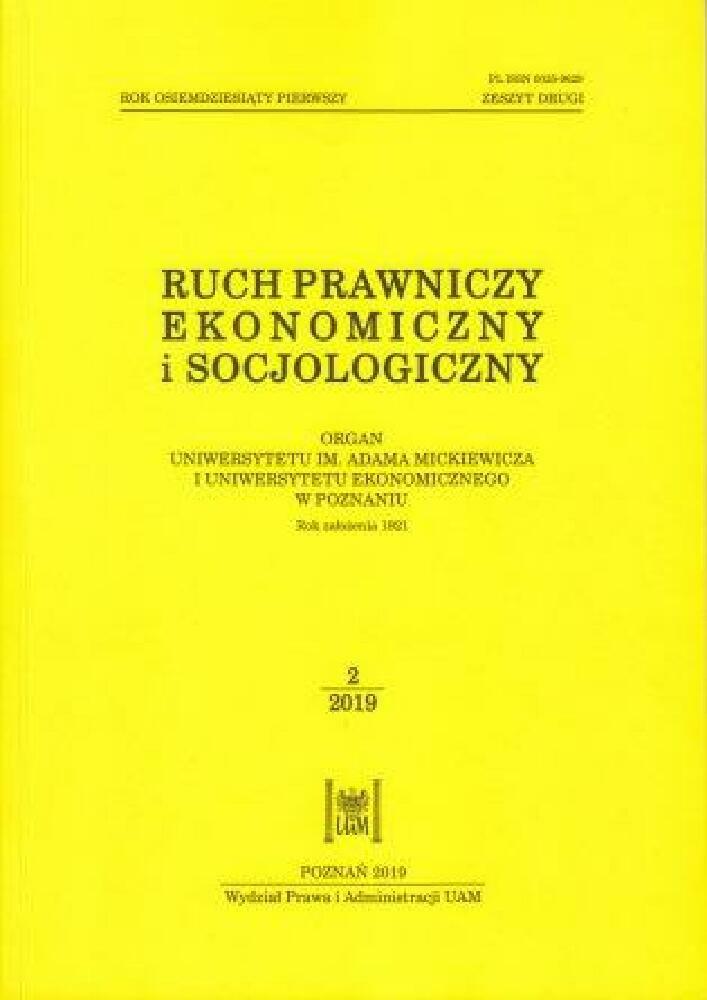Abstract
The article deals with the procedural consequences of a prosecutor’s decision closing criminal proceedings in the light of the application of the ne bis in idem prohibition. The analysis of the problem is carried out within two thematic areas designated by the scope of the ne bis in idem prohibition, namely in national conditions and within the framework of cooperation with the Member States of the EU. It is assumed that final prosecutor’s decisions on the termination of criminal proceedings create conditions for the ne bis in idem prohibition, when there is an attempt to re-initiate criminal proceedings against the same person for the same act. This tendency is not only characteristic of the Polish system, but is also visible in the criminal-law legislation of other EU Member States, and meets with cautious approval in the case law of the Court of Justice of the European Union (CJEU). As part of the penal cooperation of EU Member States for the interpretation of Article 54 of the Convention implementing the Schengen Agreement, the CJEU’s case law, in which the principle of the mutual recognition of judgments and judicial decisions is primarily used, is of the utmost importance. The connection between the application of the rule ne bis in idem and the principle of the mutual recognition of judgments and judicial decisions in the framework of criminal cooperation between EU Member States results from the fundamental role that this principle fulfills with regulations adopted in the Treaty on the functioning of the EU (Section: Area of Freedom, Security and Justice). The article shows that the concept of classifying the principle ne bis in idem in the Polish criminal procedural system as a negative procedural condition defined in Article 17 para. 1 item 7 of the Code of Criminal Procedure is the optimal solution, assuming that the res iudicata effect is reserved exclusively for the assessment of court judgments. The importance of the issue of the identity of the act as one of the criteria for the application of the ne bis in idem prohibition is also duly emphasized, given the thesis, which is referred to especially in the jurisprudence of the CJEU, that in such situations it is necessary to determine whether the act to which the final judgment relates is the same as the factual basis for the investigation or inquiry in which the decision to discontinue the proceedings is to be issued without assessing the adopted legal classification of the act or the legal interest of the State.References
Daszkiewicz, W. (1964). Przekazanie sprawy na drogę procesu powszechnego. Wojskowy Przegląd Prawniczy 19(1–3): 33–55.
Gaberle, A. (1972). Umorzenie postępowania przygotowawczego w polskim procesie karnym. Warszawa.
Gerecka-Żołyńska, A. (2016). Niezależność prokuratury i prokuratorów – nowe rozwiązania na tle dotychczasowych kontrowersji (uwagi w związku z ustawą z 28 stycznia 2016 roku – Prawo o prokuraturze). Ruch Prawniczy, Ekonomiczny i Socjologiczny 78(1): 57–70.
Haber, J. (1961). Zagadnienie prawomocności postanowień prokuratorskich w postępowaniu karnym. Nowe Prawo 4: 440–453.
Kaftal, A. (1966). Prawomocność wyroków sądowych w polskim prawie karnym procesowym. Warszawa.
Kempen, P.H., Bemelmans, J. (2018). EU protection on the substantive criminal law principles of guilt and ne bis in idem under the Charter of Fundamental Rights: underdevelopment and overdevelopment in an incomplete justice framework. New Journal of European Criminal Law 9(2): 249–251.
Kmiecik, R. (1995). Glosa do postanowienia SN z dnia 17 czerwca 1994 r. sygn. WZ 122/94. Wojskowy Przegląd Prawniczy 3/4: 78–85.
Kmiecik, R. (1998). Prawomocność postanowień prokuratora w świetle k.p.k. z 1997 roku, [w:] Nowy kodeks postępowania karnego. Zagadnienia węzłowe. Kraków: 193–208.
Marszał, K. (2003). Glosa do uchwały Sądu Najwyższego z dnia 26 września 2002 r. sygn. I KZP 23/02. Orzecznictwo Sądów Powszechnych 9: 448–451.
Mik, B. (1995). Glosa do postanowienia SN z dnia 17 czerwca 1994 r. sygn. WZ 122/94. Prokuratura i Prawo 11/12: 79–93.
Murzynowski, A. (2000). Prawomocność orzeczeń sądowych jako przesłanka kasacji, [w:] A. Gaberle, S. Waltoś, Środki zaskarżenia w procesie karnym. Księga pamiątkowa ku czci prof. Zbigniewa Dody. Kraków: 191–212.
Ostropolski, T. (2015). The CJEU as a defender of mutual trust. New Journal of European Criminal Law 6(2): 165–172.
Peers, S. (2006). EU Justice and Home Affairs Law. 2nd edn. Oxford.
Płachta, M. (2003). Przekazywanie skazanych między państwami. Kraków.
Rogalski, M. (2005). Przesłanka powagi rzeczy osadzonej w procesie karnym. Kraków.
Sakowicz, A. (2011). Zasada ne bis in idem w prawie karnym. Białystok.
Steinborn, S. (2001). Węzłowe problemy subsydiarnego oskarżenia posiłkowego. Prokuratura i Prawo 12: 63–95.
Śliwiński, S. (1959). Polski proces karny przed sądem powszechnym. Warszawa.
Tylman, J. (1995). Glosa do postanowienia SN z dnia 17 czerwca 1994 r. sygn. WZ 122/94. Wojskowy Przegląd Prawniczy 3–4: 85–89.
Tylman, J. (1998). Warunki dopuszczalności postępowania karnego. Przesłanki procesowe, [w:] Nowa kodyfikacja karna. Kodeks postępowania karnego, Warszawa: 6–46.
Waltoś, S. (1968). Model postępowania przygotowawczego na tle prawnoporównawczym. Warszawa.
License
Copyright (c) 2019 WPiA UAM

This work is licensed under a Creative Commons Attribution-NonCommercial-NoDerivatives 4.0 International License.





